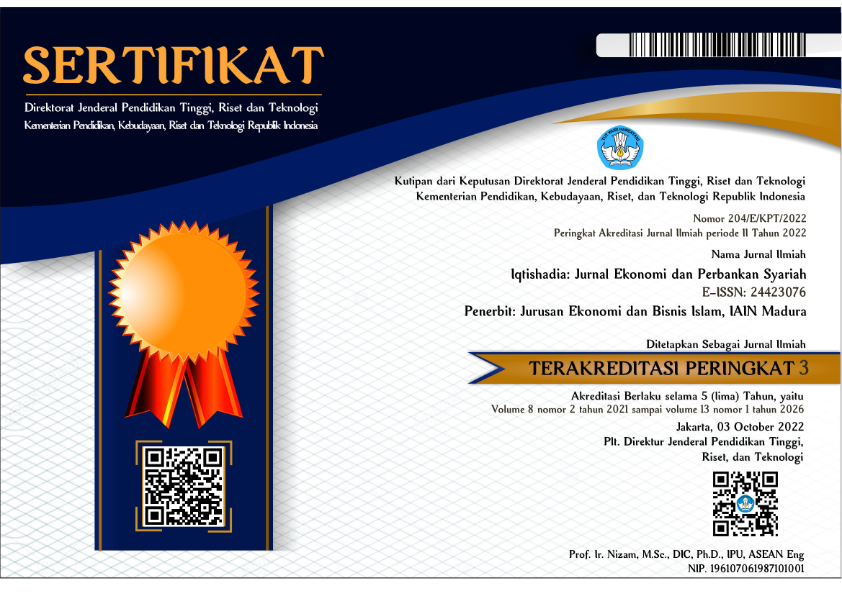Wakaf Tunai, Implementasinya dalam Sistem Perbankan Syariah di Indonesia
 Abstract views: 1012
,
Abstract views: 1012
,
 PDF downloads: 902
PDF downloads: 902
Abstract
The potential of Waqaf that comes from the donation of the Community, or so-called Waqaf of money. This type of Waqaf opens great opportunities for investment business creation, whose results can be exploited in the fields of religion, education, and social services. Waqaf cash in Indonesia has not been fully socialized and has not been handled professionally. The synergy of Waqaf and sharia banking is still less united, because when sharia and waqaf banking work together it will produce a remarkable multiplier effect. From the above context, the issues studied are formulated as follows; First, what is the role of cash waqaf in Sharia Banking? Second, how is cash waqaf effect on investment? Third, how is the strategy of developing cash waqaf in Sharia Banking? The research method used is descriptive qualitative method, while the data collection procedure using bibliography, Documentation Method, Observation Method. The researcher concludes that the implementation of cash waqaf in the Islamic Banking system is still not optimal because the regulation on cash waqaf indicates that the Sharia Banking still cannot manage the cash waqaf fund is only limited to the institution in receiving Waqaf fund. While the cash waqaf securities in Investments, indicate that cash waqaf can affect the development of Investment if the cash waqaf is invested in the right field so as to increase the expected profit level. Due to the huge potentials, it is necessary to formulate several strategies to improve the development of cash waqaf especially in Sharia Banking.
Downloads
References
Abidin, Zainal. “Mapping Pemikiran Akademisi dalam Madzhab Ekonomi Islam Kontemporer.” IQTISHADIA: Jurnal Ekonomi & Perbankan Syariah 1, no. 2 (2015): 263–274.
Al-Arif, Nur Rianto. “Teori Makroekonomi Islam Konsep, teori, dan Analisa”. Bandung: Alfabeta, 2010.
Al-Qur’an dan Terjemah Departemen Agama RI, (Bandung: PT sygma examedia arkanleema. 2009)
Amin, Riawan. “Peran LKS dalam pengembangan Wakaf Uang”, Al-Awqaf, Volume 1 Nomor 1, (Desember 2008).
Badan Pusat Statistik, diakses dari http://www.bps.go.id, pada tanggal 6 November 2016 pukul 22.56 WIB
Badan Wakaf Indonesia, diakses dari http://www.bwi.go.id, pada tanggal 12 Januari 2017 pukul 10.00 WIB
Khalil, Jafril. “Standarisasi Nazhir Wakaf Uang professional”. Al-Awqaf, Volume 1, Nomor 1, (Desember 2008).
Khosyiah, Siah. “Wakaf dan Hibah perspektif ulama fiqh dan perkembangannya di Indonesia”. Bandung: CV Pustaka Setia. 2010.
Pembukaan Undang-Undang Dasar tahun 1945. Jakarta: Arta Duta Mas, 1994.
Rosalinda, “Manajemen Wakaf Produktif”. Jakarta: Rajawali Press, 2015.
Sula, Muhammad Syakir. “Menakar Kerjasama Nazhir dengan LKS”. Al-Awqaf, Volume 1, Nomor 1 (Desember 2008).
TIM Dewan Pengawas Syariah di Wilayah Kerja Otoritas Jasa Keuangan Kantor Regional 3 Jawa Timur, Bali, Nusa Tenggara, “kumpulan Khotbah Bisnis dan Keuangan Syariah”. Surabaya: Otoritas Jasa Keuangan, 2015.
Warka, Made, dan Erie Hariyanto. “Kedudukan Bank Syariah dalam Sistem Perbankan di Indonesia.” IQTISHADIA: Jurnal Ekonomi & Perbankan Syariah 3, no. 2 (2016): 235–258.
The journal operates an Open Access policy under a Creative Commons Non-Commercial Share-Alike license. All articles published Open Access will be immediately and permanently free for everyone to read and download.
• Creative Commons Attribution-NonCommercial (CC-BY-NC)

Iqtishadia: Jurnal Ekonomi dan Perbankan Syariah by http://ejournal.iainmadura.ac.id/index.php/iqtishadia is licensed under a Creative Commons Attribution-NonCommercial 4.0 International License.
Based on a work at http://ejournal.iainmadura.ac.id.


























